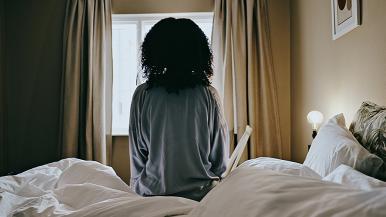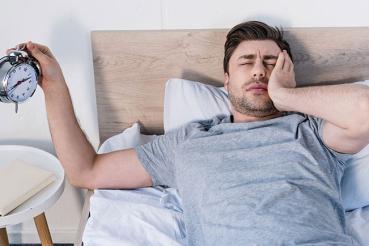If you're like most Americans, you're not getting enough sleep.
How can you tell? Take note of how you feel in the early to mid-afternoon during a sedentary activity like sitting in a meeting or driving a car, recommends James Wyatt, PhD, director of the Sleep Disorders Service and Research Center at Rush University Medical Center.
If you haven't resorted to caffeine or jumping jacks to pep yourself up and you feel alert, then you're probably getting enough sleep. If you feel sleepy, then you know you're sleep deprived.
Normally, the body's internal clock is programmed to keep a person awake during the day and sleeping most of the night. That means that for each 15 to 17 hours that you're awake, you need to sleep seven to nine hours.
Each night that you don't get enough sleep, you acquire an acute sleep debt. Over time, as you continue to sleep less than you need and not let yourself make up the lost sleep, you build up a chronic sleep debt.
How your body copes with sleep loss
To better understand how acute and chronic sleep loss affects a person, Wyatt collaborated on a study with researchers at Brigham and Women's Hospital in Boston that was published in the journal Science Translational Medicine.
For three weeks, the study exposed healthy young adults to repeated bouts of sleep deprivation, followed by opportunities to sleep for 10 hours at a time. The results demonstrated that chronic sleep loss negatively affects a person's performance, as measured by reaction timing tests.
And it adds up over time — the more sleep the study subjects lost, the more their performance deteriorated with each day and with each additional waking hour. This negative effect is felt more strongly at night. When study participants with chronic sleep loss attempted to work extended hours into the night, their reaction times became 10 times slower.
Your body can cope — but not for long
Interestingly, the researchers found that the body can temporarily compensate for sleep loss and even chronic sleep debt during parts of the day. The body's internal clock helped people perform well on reaction timing tests during the late afternoon to early evening despite substantial acute and chronic sleep loss.
Also, in the morning after a 10-hour sleep, study subjects performed well on reaction timing tests. This is similar to when you wake up after sleeping in on the weekend and feel refreshed.
"You can be fooled into thinking that you've made up your sleep debt," says Wyatt, "but the longer you're awake, the more you pay the price."
He explains that you may feel this recovery for four to six hours after waking from extended sleep, but after that, the lost sleep will catch up with you.
Zeroing out your sleep debt
Since the chances are high that you've acquired a sleep debt, how can you get rid of it? Wyatt recommends making up sleep any way you can — whether it's sleeping in as long as possible or taking short naps (ideally lasting 15 to 20 minutes) during the day.
It's also best to prevent an acute sleep debt from becoming a chronic sleep debt by making up the sleep within a few days. It may be hard though because, for example, the weekend isn't long enough to make up for the sleep you've lost during the week. That could take up to a week or more.
For this reason, Wyatt says that your main strategy should be to get sufficient sleep every night. It's understandable if you need to make up for lost sleep every so often, but it's best to make that a rarity instead of the norm.
Try these tips from the National Sleep Foundation to help you sleep better on a regular basis.
Avoid alcohol before bedtime. Although many people think alcohol is a sedative, it actually disrupts sleep and can lead to a night of less restful sleep.
1. Establish a soothing bedtime routine.
A relaxing, routine activity — such as soaking in a hot bath and then reading or listening to soothing music before bedtime — helps separate sleep time from activities that can cause excitement, stress or anxiety.
Avoid arousing activities before bedtime like working, paying bills or family problem-solving. Also, avoid exposure to bright light before bedtime because it signals the brain that it's time to awaken, not sleep.
2. Create a sleep-conducive environment.
Design your sleep environment to be cool, quiet, dark, comfortable and free of interruptions. It's best to take work materials, computers and televisions out of the bedroom. Make sure your mattress and pillows are comfortable and supportive. And try to block out noise or distractions by using blackout curtains, eye shades or ear plugs.
3. Finish eating at least two to three hours before bedtime.
Eating or drinking too close to bedtime may make you less comfortable when settling down for bed. Try to restrict fluids a few hours before bedtime to prevent nighttime awakenings to go to the bathroom.
Also, avoid alcohol before bedtime. Although many people think alcohol is a sedative, it actually disrupts sleep and can lead to a night of less restful sleep.
4. Exercise regularly.
In general, exercising regularly makes it easier to fall asleep and contributes to sounder sleep. Since exercise stimulates your heart, brain and muscles, it's best to complete your workout at least a few hours before bedtime so that your body has time to relax.
5. Avoid caffeine and nicotine before bedtime.
Caffeine and nicotine are stimulants that make you more alert and disrupt your sleep. Caffeine products, such as coffee, tea, colas and chocolate, remain in the body an average of three to five hours for most people.
If you smoke, the nicotine in tobacco products can cause difficulty falling asleep, problems waking in the morning and nightmares. If you have difficulty sleeping, it may be one more reason to quit smoking.
These tips can help you achieve sleep and the benefits it provides. If you have trouble sleeping or feel fatigued during the day despite getting sufficient rest, you should consult your doctor. He or she can help figure out if an underlying medical condition may be affecting your sleep.




